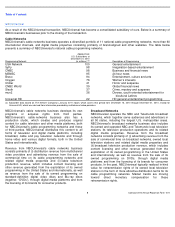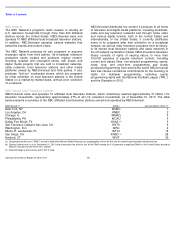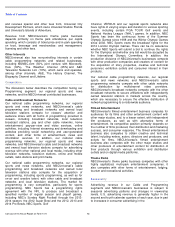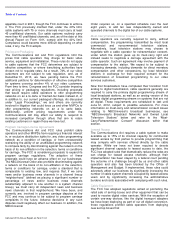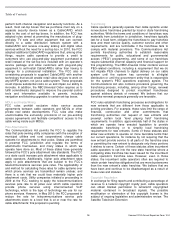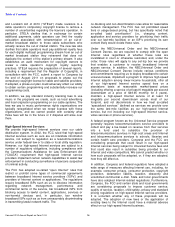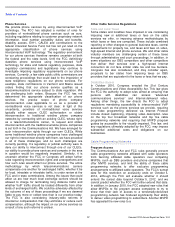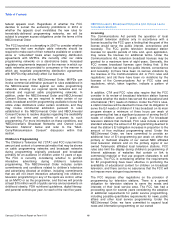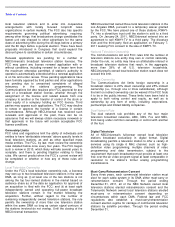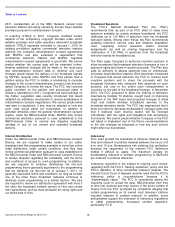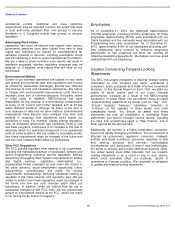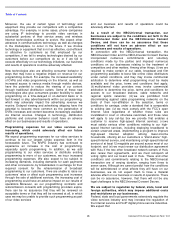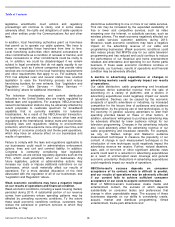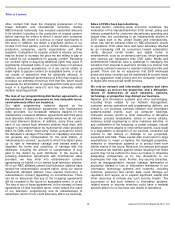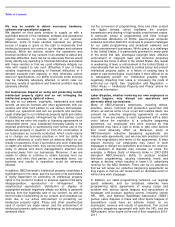Comcast 2010 Annual Report Download - page 23
Download and view the complete annual report
Please find page 23 of the 2010 Comcast annual report below. You can navigate through the pages in the report by either clicking on the pages listed below, or by using the keyword search tool below to find specific information within the annual report.
Table of Contents
local television stations and to enter into cooperative
arrangements with locally focused nonprofit news
organizations in certain markets. The FCC also has specific
requirements governing political advertising, requiring,
among other things, that broadcasters charge candidates the
lowest unit rate charged to other advertisers for the same
class of advertising time during the 45 days before a primary
and the 60 days before a general election. There have been
proposals introduced in Congress that could expand the
discount given to candidates in certain circumstances.
Renewal applications are pending for a number of
NBCUniversal’s broadcast television station licenses. The
FCC may grant any license renewal application with or
without conditions, including renewal for a lesser term than
the maximum otherwise permitted. A station’s authority to
operate is automatically extended while a renewal application
is on file and under review. Three pending applications have
been formally opposed by third parties and other applications
are pending due to unresolved complaints of alleged
indecency in the stations’ programming. The
Communications Act also requires prior FCC approval for any
sale of a broadcast station license, whether through the
assignment of the license and related assets from one
company to another or the transfer of control of the stock or
other equity of a company holding an FCC license. Third
parties may oppose such applications. The FCC may decline
to renew or approve the transfer of a license in certain
circumstances. Although NBCUniversal has received such
renewals and approvals in the past, there can be no
assurance that we will always obtain necessary renewals or
that approvals in the future will contain acceptable FCC
license conditions.
Ownership Limits
FCC rules and regulations limit the ability of individuals and
entities to have “attributable interests” above specific levels in
local television stations, as well as other specified mass
media entities. The FCC, by law, must review the ownership
rules detailed below once every four years. The FCC began
such a review in 2010, which likely will take several years to
complete, and there is pending litigation relating to these
rules. We cannot predict when the FCC’s current review will
be completed or whether or how any of these rules will
change.
Local Television Ownership
Under the FCC’s local television ownership rule, a licensee
may own up to two broadcast television stations in the same
DMA, as long as (i) at least one of the two stations is not
among the top four-ranked stations in the market based on
audience share as of the date an application for approval of
an acquisition is filed with the FCC; and (ii) at least eight
independently owned and operating full-power broadcast
television stations remain in the market following the
acquisition. Further, without regard to the number of
remaining independently owned television stations, the rule
permits the ownership of more than one television station
within the same DMA so long as certain signal contours of
the stations involved do not overlap. Until the closing of the
NBCUniversal transaction,
NBCUniversal had owned three local television stations in the
Los Angeles DMA, pursuant to a temporary waiver granted
by the FCC. We have placed one of those stations, KWHY-
TV, into a divestiture trust until the station is sold to a third
party. On January 24, 2011, NBCUniversal entered into an
agreement to sell KWHY-TV to a third party. The divesture
trust and the third party filed an application on February 7,
2011 seeking FCC consent to the sale of KWHY-TV.
National Television Ownership
The Communications Act and FCC rules limit the number of
television stations one entity may own or control nationally.
Under the rule, no entity may have an attributable interest in
broadcast television stations that reach, in the aggregate,
more than 39% of all U.S. television households.
NBCUniversal’s owned local television station reach does not
exceed this limit.
Foreign Ownership
The Communications Act limits foreign ownership in a
broadcast station to 20% direct ownership and 25% indirect
ownership (i.e., through one or more subsidiaries), although
the limit on indirect ownership can be waived if the FCC finds
it to be in the public interest. These limits have been held to
apply to both voting control and equity, as well as to
ownership by any form of entity, including corporations,
partnerships and limited liability companies.
Dual Network Rule
The dual network rule prohibits any of the four major
television broadcast networks, ABC, CBS, Fox and NBC,
from being under common ownership or control with another
of the four.
Digital Television
All of NBCUniversal
’s full-power owned local television
stations broadcast exclusively in digital format. Digital
broadcasting permits a television station to offer a variety of
services using its single 6 MHz channel, such as high-
definition video programming, multiple channels of video
programming and data transmission, subject to the
requirement that each broadcaster must provide at least one
free over-the-air video program signal at least comparable in
resolution to the station’s former analog programming
transmissions.
Must-Carry/Retransmission Consent
Every three years, each commercial television station must
elect for each cable system in its DMA either must-carry or
retransmission consent. Through the period ending
December 31, 2011, all of the NBC Network owned local
television stations elected retransmission consent and the
Telemundo Network owned local television stations elected
must-carry or retransmission consent depending on
circumstances within each DMA. Federal law and FCC
regulations also establish a must-carry/retransmission
consent election regime for carriage of commercial television
stations by satellite providers. Through the period ending
December 31,


